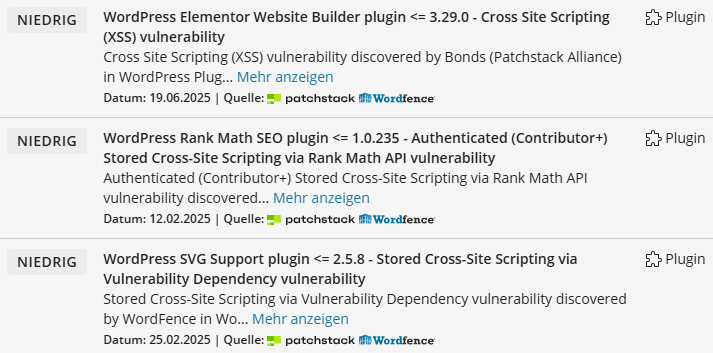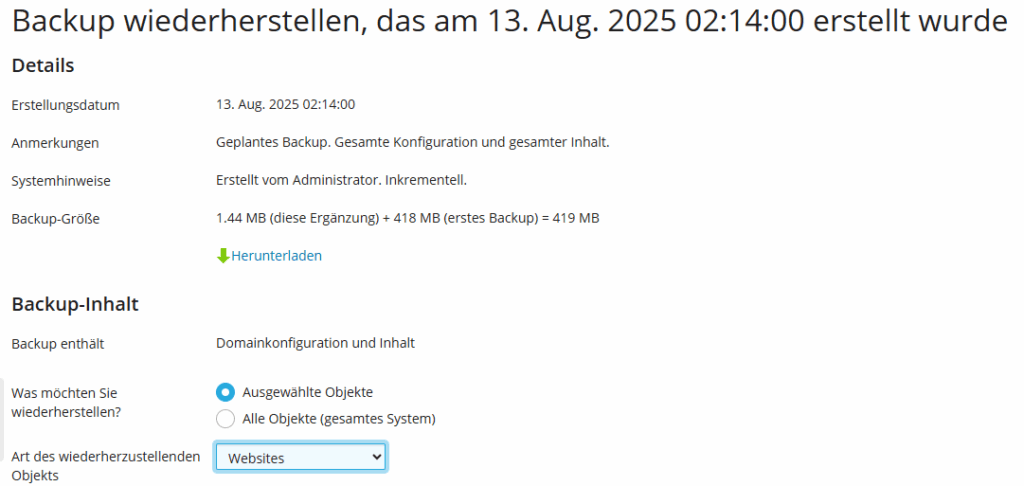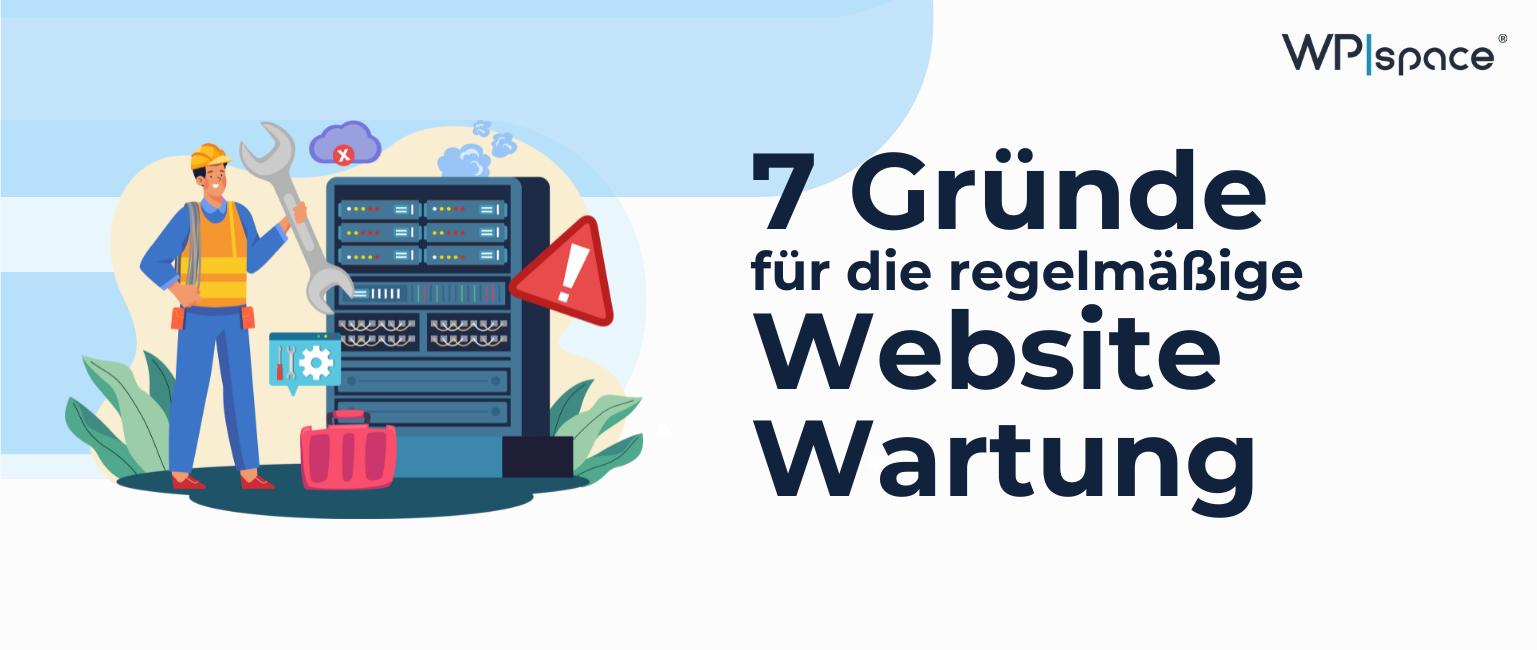"If it works, it works, right?" That's what many website operators think. It's understandable: the site loads quickly, there are no error messages in sight, customers are ordering, the blog is working. And that's exactly why the topic of maintenance usually slips to the bottom of the to-do list - somewhere between tax returns and privacy policy.
But therein lies the risk: maintenance is not important when something is broken, but before.
In this article, I'll show you why regular WordPress maintenance is a must - not out of technical panic, but out of entrepreneurial foresight. For security, stability, performance and peace of mind.
1. WordPress Security: When gaps remain undiscovered
"It'll be fine." That's what many people think until the first spam email arrives via the contact form or advertising for dubious products suddenly appears on the homepage. What many people don't know: WordPress itself is very secure. But as soon as plugins or themes are not updated regularlygateways are created faster than you think.
Particularly critical:
- Popular plugins that are widely used. As soon as a vulnerability becomes public, bots automatically scan the web for vulnerable sites. And the ones that not be maintainedare at the top of the list.
- Plugins that are no longer being developed: There are plugins that have not been further developed for months or years. As a result, security gaps are no longer closed and pose a risk to your WordPress website.

What you should do specifically:
- Schedule updates regularly - Ideally with a fixed routine (e.g. weekly)
- Use security pluginse.g. Wordfence or Ninja Firewall
- Secure admin accessNo "admin", strong passwords, ideally with two-factor authentication (2FA)
- Take error messages seriouslye.g. via "Website status" in WordPress
- Check the security recommendations in your hosting: If you use a professional WordPress host, they will provide you with information about existing security vulnerabilities on your website in their server management interface.
Regularly checking current security gaps in plugins, themes or WordPress itself can take a lot of time If you don't have time to carry out regular security checks, you can also rely on a professional maintenance partner. Many agencies or specialized services proactively take care of updates, access protection and monitoring.
2. performance: WordPress is getting slow - creeping
A new page, a few images, two plugins... up and running! But over time, the website grows - more content, more extensions, more database load. And at some point, "fast loading" turns into a slow page load that puts off potential visitors.
The tricky thing is that performance problems rarely happen suddenly. They creep in and often go unnoticed because we usually access our site via Wi-Fi. The situation is different for mobile users, weak networks or search engines.
The consequences:
- Higher bounce rates
- Poorer rankings on Google
- Falling conversion rate

What you should do specifically:
- Measure loading times regularly: Tools like GTmetrix, Pingdom or PageSpeed Insights help further
💡Tip: Always test the loading speed of your website from Germany or a neighboring country. This will give you realistic results. If, on the other hand, you measure from the USA, the values for a German hosting provider will automatically be worse because the data has to travel halfway around the globe. - Activate caching: The best way to do this is with a WordPress plugin like WP Rocket* or Accelerate WP
- Clean up the database: Delete revisions, transients, unused tables
- Compress images: With free tools such as TinyPNG or ShortPixel or WordPress plugins such as Imagify
Your Optimize WordPress pagespeed is a regular task that you should always keep in mind when making adjustments to your website.
3. SEO: No maintenance = lower rankings
You have great content, good texts, clean design - and yet your pages are bobbing somewhere on page 4 in the search results? Then maybe the problem is not at Contentbut the technology.
Because the same applies to Google: Outdated, insecure or slow websites lose trust. And trust influences the rankings.
Typical maintenance issues that affect SEO:
- Long loading times → negative for Core Web Vitals
- Missing HTTPS → Trust warning in the browser
- Broken links or mixed content → Poorer crawling results
- No mobile focus or caching → negative user experience
What you should do specifically:

- Carry out regular SEO audits (e.g. with Seobility, Screaming Frog)
- Check HTTPS & redirects
- Keep sitemaps up to datee.g. with Rank Math or Yoast SEO
- Keeping an eye on Core Web Vitalse.g. in the Google Search Console
We recommend that you create regular tasks to fix technical errors on your website immediately. This will help you avoid loss of visibility and gain further visibility in the search engines.
4. backups & recovery: when you need them, it's too late
When choosing your WordPress hosting provider, I recommend that you make sure you create daily backups that you can access at any time. Because only when something goes wrong do you realize how outdated the last backup from three days ago is or that support needs 48 hours to restore the backup of your website.

The problem: Backups are only valuable if they are complete, up-to-date and quickly available. And if you know how to play them - ideally without breaking out in a nervous sweat.
💡Tip: In all WordPress hosting plans from WPspace backups are created daily and stored for 14 days. Every WPspace customer can easily access and restore these backups at any time. There is also a Step-by-step instructions in the Help Center 😊
What you should do specifically:
- Automatic, daily Set up WordPress backups (e.g. with UpdraftPlus or via the hoster)
- Don't just rely on the hoster - At least one external backup (cloud, FTP, local)
- Test recovery regularlye.g. in a staging environment
- Document access data & backup location
💡Tip: Many maintenance services not only offer automatic backups, but also take over the restoration in an emergency - ideal if you are not familiar with the matter yourself.
5. maintenance saves money - in the long term
"Maintenance only costs time and money." True - but only at first glance. Because in reality regular maintenance routines save significantly morethan they cost.
Why? Because an unmaintained system causes problems more quickly: security gaps, outages, chaos after an update or data loss. And then it gets expensive: developer hours for recovery, SEO losses, missed sales - not to mention the stress.
Examples from practice:
- A malware-infected plugin → 6 hours cleanup and image damage
- No backups → rebuild entire website
- Downtime in the store → lost sales and support requests
What you should do specifically:
- Weigh up the costs and benefits: What does 1 hour of downtime cost you? What does maintenance cost you per month?
- Integrate maintenance into your business processes - as an integral part
- Plan your budget: rather regular two-digit amounts than four-digit amounts for an emergency rescue
💡Tip: When choosing your service provider for maintenance, make sure you have a contract with a fixed price and clearly defined services, updates, backups and support. This creates predictability and saves you money in an emergency.
6. trust: Maintenance also has an external impact
When it comes to website maintenance, many people think of technology in the background - but it is also visible at the very front. Namely exactly when something does not work: an obsolete SSL certificatea faulty redirect, broken images or a loading error in the checkout. This looks unprofessional to your visitors and also appears unsafe.
At a time when trust is everything online, the technical maintenance of your website is a decisive factor, whether customers stay or leave.
What you should do specifically:
- Always keep SSL & HTTPS active and set up correctly
💡Tip: With a managed WordPress hosting provider like WPspace, the free SSL certificate is automatically renewed, so you don't have to worry about it. - Check error messages regularly - preferably also mobile
- Keep plugins & content visibly up to date (e.g. imprint, footer data)
- Performance optimization = user experience: Fast pages create trust

If you don't have the capacity to constantly monitor your site yourself, you should rely on external support. Good maintenance partners recognize problems early - before your visitors see them.
7 Delegate maintenance - or automate it?
WordPress also offers a lot of automated maintenance. You can perform backups, updates, security scans and monitoring. partially automate. Sounds good? It is. But only if you know the processes and check them regularly.
Because: Fully automatic does not mean worry-free. Automatic updates can trigger conflicts. A backup is useless if you don't know how to install it. And a warning system is useless if nobody reacts to it.
What you should do:
- Using tools correctlye.g. UpdraftPlus, WP Rocket, NinjaFirewall, WP Umbrella
- Activate & respond to alertsE-mail notifications in the event of failures or login attempts
- Clearly regulate responsibilityWho takes care of what and when?
- Activate automatic security updates in WordPress: Deliberately activate only the relevant security updates to avoid website downtimes due to updates of major versions.
- Use professional WordPress hosting: A managed WordPress host can already relieve you of many tasks, such as regular backups, malware scans or security measures. This means you already have a clean basis.
If you don't have the time or inclination to take care of it yourself, get support. Maintenance services or WordPress agencies take care of this reliably, individually or on a subscription basis, just as you wish.
Conclusion: Maintenance is not an extra - it is the foundation
Regular WordPress maintenance is not just for perfectionists or tech nerds. It's the difference between a website that runs and one that works in the long term. Security, performance, visibility, trust - everything depends on it. And the best thing is: you don't have to look at the code every day or do everything yourself. Whether with tools or a reliable maintenance partner. You can integrate WordPress maintenance into your everyday life without it becoming a burden.
Our recommendation to you: schedule a fixed appointment per week or month. Or even simpler: seek support from a professional provider so that you can concentrate on what you really want to do.



